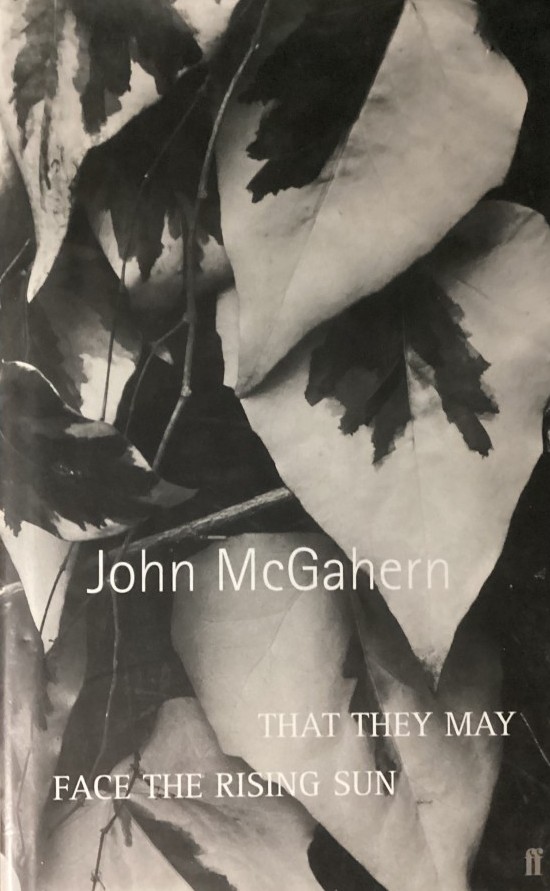Inspiring Older Readers
 posted on 27 Sep 2023
posted on 27 Sep 2023
That They May Face the Rising Sun by John McGahern
The great modernist Irish writers – James Joyce, Samuel Beckett, Flann O’Brien – are known primarily for their formal experimentation and radical use of language. These avant-garde writers believed that the novel needed to be dismantled and rebuilt before it could serve the purposes of the twentieth century.
But there is another strand of Irish literature that is most notable for its roots in the realist tradition of Chekhov, Flaubert and Turgenev: it may look conventional, even old-fashioned, but in its own quiet way what is being attempted is as adventurous as anything that Joyce and Beckett did. The great novelist and short story writer John McGahern falls into this category, I think, and the approach is exemplified in the last novel he published before his death in 2006: That They May Face the Rising Sun. It is a kind of ‘radical ordinariness’ in which moments of great epiphany exist in the everyday, the ordinary.
I have been reading the novel for a second time and yet again have found profound pleasure in its apparently simple beauty, generosity of spirit and quiet humour.
The setting is a locality that McGahern knew intimately, a remote, rural lakeside community in County Leitrim, between Carrick-on-Shannon and the border with Northern Ireland, quite close to Enniskillen. The time, although never stated, is the very early 1990s, although as with all of McGahern’s work, the full weight of Ireland’s often tragic history is never far away.
A couple in their late-forties or early-fifties, Joe and Kate Ruttledge, have fled the rat race of London and have bought and largely rebuilt a small lakeside cottage. Joe combines small farming with some kind of writing; Kate earns a little from drawing and painting. Outsiders of a kind, they have become the centre around which a host of other characters revolve. There are the near neighbours, the gentle and kindly Jamesie and his wife Mary; Joe’s imposing uncle, an illiterate but shrewd and extremely successful businessman known to all as the Shah; poor, damaged Bill Evans, ‘fostered’ by the Catholic Church as a child in the 1950s, denied education and farmed out virtually as slave labour. Other characters include John Quinn, a swaggering hail-fellow-well-met womaniser, and Jimmy Joe McKiernan, auctioneer, undertaker and IRA man, renowned for his occasional ruthlessness, respected for his iron principles.
What we are treated to is an immersion in the small affairs of this tiny hamlet through the course of a year or eighteen months or so – the cycle of the farming year, cherished rituals and ceremonies, the repetition and familiarity of daily life.
There are relatively few paragraph breaks and the novel is driven almost entirely by its wonderful, musical dialogue. It isn’t always clear who is speaking and as with much of McGahern’s work we seem dropped into it in mid-conversation, even before we have grown accustomed to the speakers. This serves to heighten the feeling of plunging into life in all its lived texture.
And nothing seems to escape McGahern’s affectionate, patient, humane gaze, whether people, places, habits, the rhythm of local speech, even the endearing behaviour of dogs, birds, cattle and cats. It doesn’t matter that what is described is mundane or quotidian; indeed, this ordinariness is the point – it makes us focus more closely on the beauty and fragility of life.
In a marvellous essay in the London Review of Books, Colm Tóibín recalls one of his final conversations with his friend John McGahern. Diagnosed with cancer, McGahern had been asked whether he wished to speak to a counsellor. I’ll let Tóibín tell the story:
"‘A counsellor!’ He shook his head at the very thought. ‘What would a counsellor tell you? You would want to be an awful fool not to know that we only bloom once.’
These were the exact words. I made sure to remember them. McGahern spoke them as though he had written them, relishing the pattern in the sound […] I remember the expression on his face even better than his voice […] a look of pure satisfaction that something true had finally been said. He had found the right words for it. And then he changed the subject."
McGahern was sometimes criticised for the unrelenting bleakness of some of his earlier novels but in this fine, late work he works a benign magic to bring a small world to life and capture life’s fleeting loveliness. Best read slowly.
Alun Severn
September 2023
John McGahern elsewhere on Letterpress
The Irish Times review by Conor McCloskey also makes for essential reading